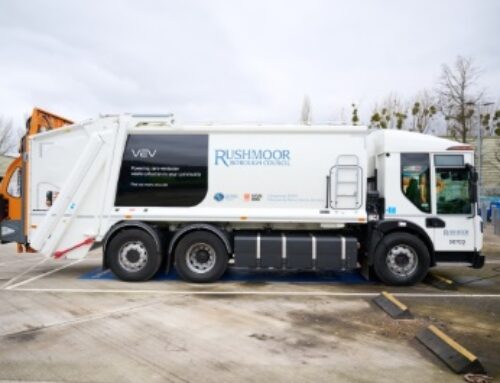DfT calls time on annual test exemptions for specialised vehicles
 The Department for Transport (DfT) has announced its intention to change the law around roadworthiness requirements for certain specialised heavy vehicles, following a consultation into current exemptions from the annual testing regime.
The Department for Transport (DfT) has announced its intention to change the law around roadworthiness requirements for certain specialised heavy vehicles, following a consultation into current exemptions from the annual testing regime.
Various subclasses of heavy vehicle, comprising an estimated 40,000 vehicles on UK roads, have been exempt from the annual testing requirement for several decades.
But the DfT now says it will amend legislation to remove the exemption for around three quarters of these vehicles from next May – within nine categories, including mobile cranes and breakdown vehicles.
The other categories include: “Engineering plant and plant, not being engineering plant, which is movable plant or equipment being a motor vehicle or trailer (not constructed primarily to carry a load) especially designed and constructed for the special purposes of engineering operations.”
This group includes volumetric concrete mixers, whose exemption had been a previous source of controversy and which DfT mentions explicitly in its consultation response as being subject to the testing regime once the changes take place.
Trailers “being drying or mixing plant designed for the production of asphalt or of bituminous or tarmacadam” are also to fall under the annual testing regime, as are tower wagons and road construction vehicles (not including road rollers, tar scrapers and other highly specialised equipment).
“Electrically propelled motor vehicles registered since 1 March 2015” will also fall under scope, as will tractor units pulling exempt trailers, and HGV chassis-based “motor tractors and heavy and light locomotives exempted under sections 185 and 186 (3) of the Road Traffic Act 1988”.
In addition, DfT confirmed it would proceed with proposals to remove the exemption from testing for vehicles on the Isle of Bute, and also for vehicles based on Arran, Great Cumbrae, Islay, Mull, Tiree or North Uist but which are used on mainland Great Britain – “but in such a way that it will not require vehicles to make special visits to mainland Britain in order to have a roadworthiness test, which would be unduly costly to these operators.”
Otherwise, vehicles newly subject to annual testing will be required to be brought to authorised testing facilities (ATFs) and tested by Driver & Vehicle Standards Agency (DVSA) personnel like any other.
Where this is not possible due to an unusual vehicle design, the vehicle testers “will satisfy themselves that safety and environmental standards will be maintained”.
The DVSA will also be able to designate one-off or ‘occasional’ sites to test a small number of vehicles that may not fit into ATFs. DfT anticipates that such cases will be infrequent.
Vehicles newly in scope will be subject to the existing test fee structure, and will also generally be required to be plated, as under the existing regime.
“However, we are aware that in certain cases there may be difficulties in determining the plated weight of the vehicle,” the DfT conceded.
“Therefore, we intend to amend the regulations to give DVSA the discretion on whether a vehicle can be plated to allow these specific vehicles to undergo a roadworthiness test without a plate.”
Discussions are still ongoing about volumetric concrete mixer weight limits, and they will therefore be exempt from plating requirements until this is resolved.
Meanwhile, some exemptions from annual testing considered during the consultation will remain in place – such as for vehicles operating under the Road Vehicles (Authorisation of Special Types) General Order 2003 (STGO) regulations or vehicle special orders, as provided for by Section 44 of the Road Traffic Act 1988.
This category comprises vehicles authorised for road use by special provision, despite being non-compliant with normal regulations, usually because of excess length, width or weight – and includes vehicles used to carry abnormal, indivisible loads.
The government will also retain the exemption from annual testing for: “vehicles constructed or adapted for, and used primarily for the purpose of, medical, dental, veterinary, health, educational, display, clerical or experimental laboratory services.”
Finally, showman’s vehicles, such as those engaged in the carriage of funfairs and travelling circuses, will also remain exempt from testing under special provisions.
The DfT first proposed changes in December 2014, with a view to improving road safety – stating that all heavy vehicles based on HGV chassis should undergo annual testing unless a clear reason could be identified as to why it was “not practical or proportionate”.
In a foreword to the government’s response to the consultation, the transport minister Jesse Norman said that the 70 responses it received from stakeholders were: “broadly in favour of the principle of introducing mandatory roadworthiness testing for specialised heavy vehicles, which can weigh up to 44 tonnes, where this is practicable and proportionate.”
He continued: “It is important that the regulatory regime keeps up as the vehicles used on our roads develop and adapt. Increased standardisation of design has made many formerly special, “untestable” vehicles no different from a practical perspective from heavy goods vehicles.
“At the same time, we have listened to stakeholders’ views, and where there are good reasons for certain vehicles remaining outside the formal testing regime, the proposals have been modified accordingly.”
The changes are expected to come into force from 20 May 2018, and will be effected via amendments to the Goods Vehicles (Plating & Testing) Regulations 1988.
The full consultation response document can be read here.











